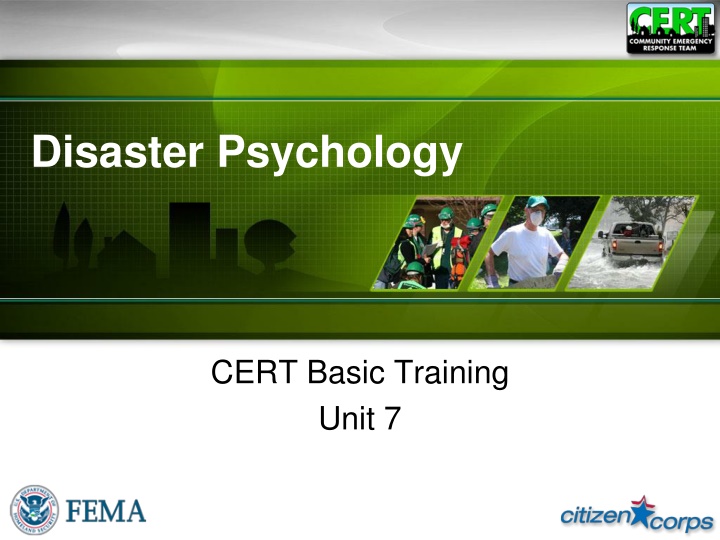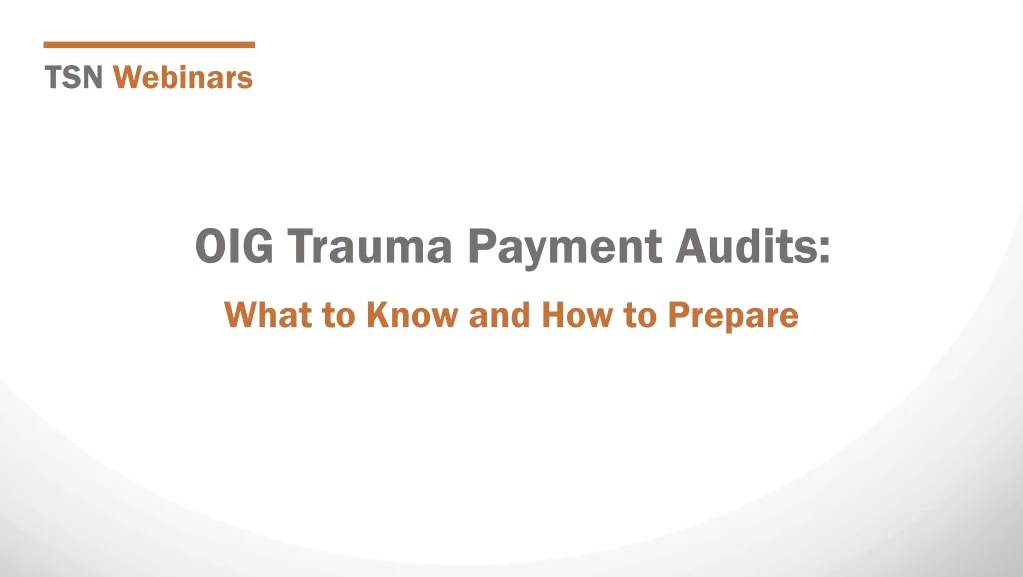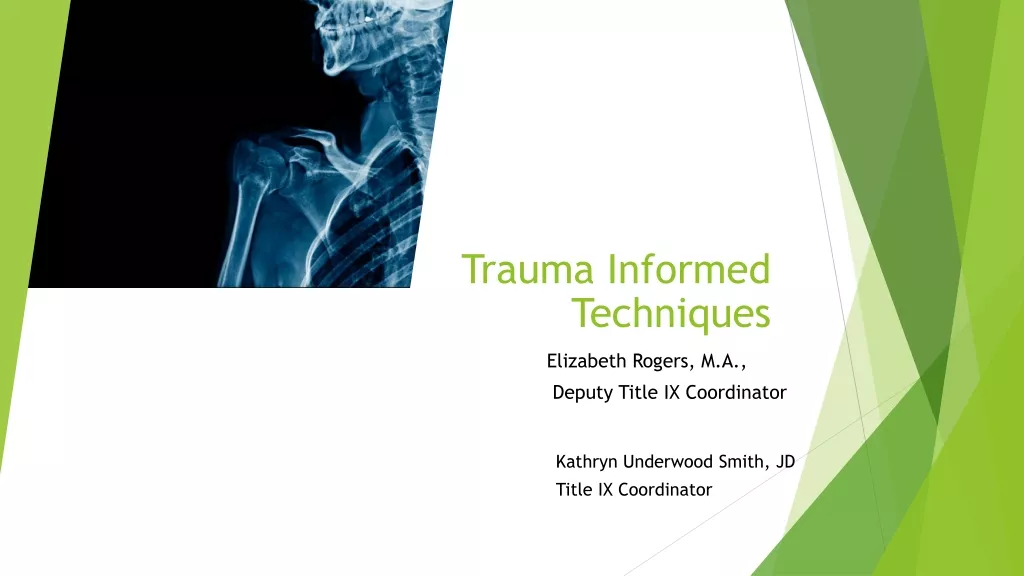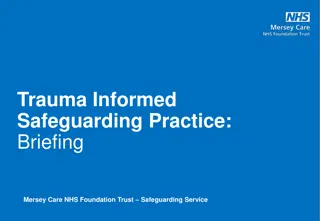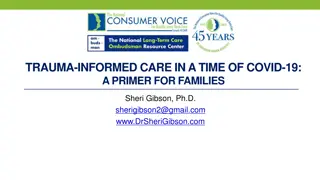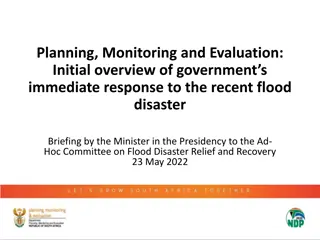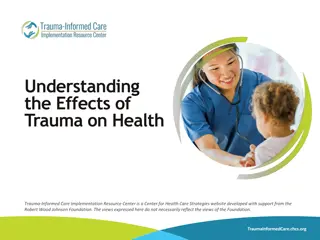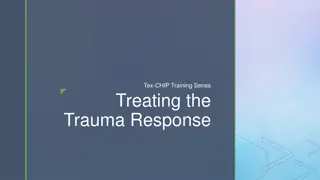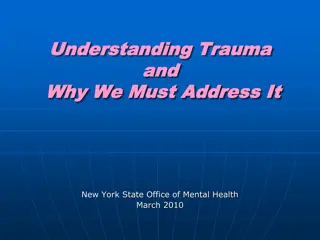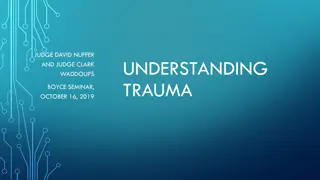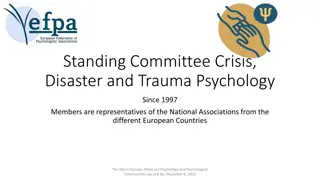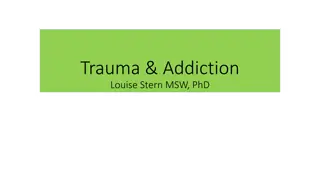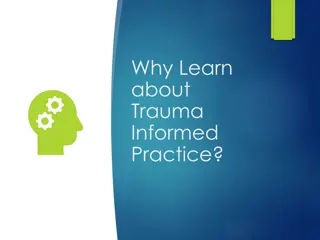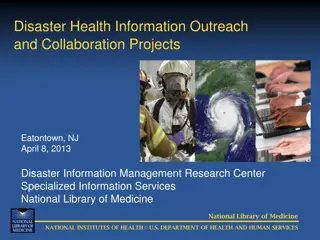Disaster Psychology and Trauma Management
Delve into the complexities of disaster psychology and trauma management in CERT Basic Training Unit 7. Explore topics such as recognizing emotional environments, alleviating stress for survivors and rescuers, and identifying psychological and physiological symptoms of trauma. Learn how to support team well-being and implement strategies to reduce stress effectively.
Download Presentation

Please find below an Image/Link to download the presentation.
The content on the website is provided AS IS for your information and personal use only. It may not be sold, licensed, or shared on other websites without obtaining consent from the author.If you encounter any issues during the download, it is possible that the publisher has removed the file from their server.
You are allowed to download the files provided on this website for personal or commercial use, subject to the condition that they are used lawfully. All files are the property of their respective owners.
The content on the website is provided AS IS for your information and personal use only. It may not be sold, licensed, or shared on other websites without obtaining consent from the author.
E N D
Presentation Transcript
Disaster Psychology CERT Basic Training Unit 7
Unit Objectives Describe disaster and post-disaster emotional environment for survivors and rescuers Describe steps rescuers can take to relieve their own stress and that of other survivors CERT Basic Training Unit 7: Disaster Psychology 7-1
Unit Topics Disaster Trauma Team Well-Being Working with Survivors Trauma CERT Basic Training Unit 7: Disaster Psychology 7-2
Psychological Trauma Your own personal losses Working in your neighborhood Assisting neighbors, friends, coworkers who have also been injured Not feeling safe and secure CERT Basic Training Unit 7: Disaster Psychology 7-3
Psychological Symptoms of Trauma Irritability or anger Self-blame or blaming others Isolation and withdrawal Fear of recurrence Feeling stunned, numb, overwhelmed Feeling helpless Mood swings Sadness, depression, grief Denial Concentration and memory problems Relationship problems/marital discord CERT Basic Training Unit 7: Disaster Psychology 7-4
Physiological Symptoms of Trauma Loss of appetite Headaches or chest pain Diarrhea, stomach pain, or nausea Hyperactivity Increase in drug consumption Nightmares Insomnia Fatigue CERT Basic Training Unit 7: Disaster Psychology 7-5
Team Well-Being Actions can be taken before, during, and after an incident to help manage emotional impact of disaster response work Knowing possible psychological and physiological symptoms of disaster trauma helps manage impact Learn to manage stress CERT members for themselves CERT leaders during response CERT Basic Training Unit 7: Disaster Psychology 7-6
How You Reduce Stress Get enough sleep Exercise regularly Eat a balanced diet Balance work, play, and rest Allow yourself to receive as well as give Connect with others Use spiritual resources CERT Basic Training Unit 7: Disaster Psychology 7-7
Take Care of Yourself Be aware of trauma that can follow a disaster Explain to family members and friends what you need: Listen when you want to talk Don t force you to talk CERT Basic Training Unit 7: Disaster Psychology 7-8
How Team Leaders Reduce Stress Brief CERT personnel beforehand Remember CERT is a team Rest and regroup Take breaks away Eat properly, stay hydrated Arrange for debriefing Rotate teams and duties Phase out workers gradually CERT Basic Training Unit 7: Disaster Psychology 7-9
Critical Incident Stress Debriefing 1. Introductions and description 2. Review of factual material 3. Sharing of initial thoughts and feelings 4. Sharing of emotional reactions to incident 5. Instruction about normal stress reactions 6. Review of symptoms 7. Closing and further needs assessment CERT Basic Training Unit 7: Disaster Psychology 7-10
Phases of a Crisis Impact Inventory Rescue Recovery CERT Basic Training Unit 7: Disaster Psychology 7-11
Traumatic Crisis Actual or potential death Serious injury Destruction Loss of contact with family or close friends CERT Basic Training Unit 7: Disaster Psychology 7-12
Effects of Traumatic Stress Cognitive functioning Physical health Interpersonal relationships CERT Basic Training Unit 7: Disaster Psychology 7-13
Mediating Factors Prior experience with a similar event Intensity of disruption Individual feelings about event Emotional strength of individual Length of time since event CERT Basic Training Unit 7: Disaster Psychology 7-14
Stabilizing Survivors Assess survivors for injury or shock Get uninjured people to help Provide support by: Listening Empathizing Help survivors connect with natural support systems CERT Basic Training Unit 7: Disaster Psychology 7-15
How to Be an Empathetic Listener Put yourself in the speaker s shoes Listen for meaning, not just words Pay attention to nonverbal communication Paraphrase the speaker CERT Basic Training Unit 7: Disaster Psychology 7-16
Avoid Saying I understand Don t feel bad You re strong or You ll get through this Don t cry It s God s will It could be worse At least you still have Everything will be okay CERT Basic Training Unit 7: Disaster Psychology 7-17
Managing the Death Scene Cover the body; treat it with respect Move the body to temporary morgue Follow local laws and protocols Talk with local authorities CERT Basic Training Unit 7: Disaster Psychology 7-18
Informing Family/Friends of a Death Separate the family member(s) or friend(s) Have the person(s) sit down Make eye contact I m sorry, but your family member has died. I am so sorry. Let the family and friends grieve CERT Basic Training Unit 7: Disaster Psychology 7-19
Unit Summary Rescues may be unpleasant or uncomfortable Psychological and physiological symptoms of trauma Take steps to reduce stress CISD is one intervention Four emotional phases of a disaster Stress affects cognition, health, and interactions Stabilize individuals Be an empathetic listener CERT Basic Training Unit 7: Disaster Psychology 7-20
Homework Assignment 1. Read unit to be covered in next session 2. Bring necessary supplies to next session 3. Wear appropriate clothes to next session CERT Basic Training Unit 7: Disaster Psychology 7-21
